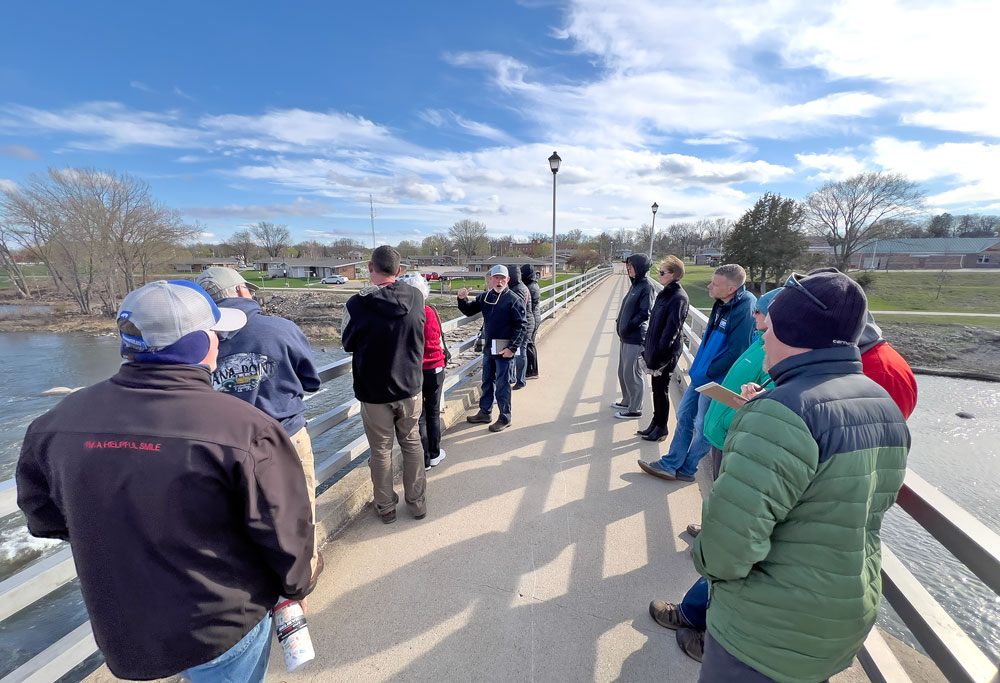Private ownership of fiber transport links could reduce Charles City broadband system cost
By Bob Steenson, bsteenson@charlescitypress.com
The Charles City Telecommunications Utility is looking at options for the fiber optic trunk lines connecting the city to the internet as part of its efforts to reduce costs and make the project more attractive to lenders.
The utility board in November “hit pause” after failing to secure financing at workable terms for the proposed Charles City Fiber system that would deliver high-speed broadband service to businesses and residences in the city.
The board spent its meeting Tuesday afternoon renewing contracts with a couple of the consultants who have been helping with the project, then listening to another of those consultants explain his ideas for the fiber transport legs that would connect with Mason City to the west, and New Hampton, Waverly and Cedar Falls to the east.
Todd Kielkopf, president of Kielkopf Advisory Services of Des Moines, said the goal is to shave off some of the $22 million price tag, along with other strategies such as finding other revenue sources, to make the project marketable.
The Charles City utility had initially proposed owning the transport leg to Mason City, as well as the leg east as far as the Floyd/Chickasaw county line, where it would meet the transport leg from New Hampton’s new broadband utility.
Now, it is considering forming an alliance with a group of private “equity partners,” where Charles City would trade the engineering work that has already been done designing the transport lines for dedicated access to six of the fiber “strands.”
Two strands would be enough capacity to support the entire Charles City system initially, and the other four would give the city room for other growth or other opportunities, Kielkopf said. The equity partners would own the lines and would use the remaining 74 strands for their own use or to lease to others for revenue.
“The transport is a fairly major component of the capital. There’s a cost to that capital. That cost is probably higher than what we had hoped for,” Kielkopf said, adding that the higher initial costs also result in higher required reserve funds and higher required cash flow to repay the debt.
Kielkopf said turning the construction costs over to a private company composed of equity partners would potentially shave $2 million off the construction cost of the project to Charles City, as well as reducing up-front financing and reserve costs.
Another business, which Kielkopf did not identify, is already in the process of getting bids to install a fiber line between Mason City and Charles City, and that business is willing to be a “joint build partner,” running one duct for its own line and another duct for the equity partners’ fiber inside one trench and sharing the costs.
One problem is that Kielkopf is under contract with the Charles City utility, but the equity partnership he is trying to put together could also have a business relationship with Kielkopf’s company.
To avoid conflicts, the telecom board passed a memorandum of understanding (MOU) with Kielkopf Advisory Services so Kielkopf can act independently to put together the fiber alliance while still being under contract to the utility board.
“This MOU authorizes me to try to put a deal together that would come back to the board,” Kielkopf said, but there is also a chance he could put together an alliance that could proceed in some fashion without Charles City.
“I proposed language and your legal counsel worked with it to make sure there was no additional compensation, there’s no duplicity of hours,” Kielkopf said. “I’ve agreed to a lot of things to make sure that only the parties that benefit should have to pay for my time.”
At the telecom board’s last meeting, in December, the board extended Kielkopf’s consultant contract, with a stipulation that he won’t get paid for his time working for the utility until the project receives financing.
The goal now, Kielkopf said, is to create an alliance that would include what he called Red Cedar LLC — the group of equity partners that would pay to install the fiber and then market the fiber strands that aren’t dedicated to Charles City.
“The difference is that the LLC can collateralize the asset,” he said. “There are excess strands, 74 excess strands which people want, and they can finance it by having title to those strands and then collateralizing the asset.
“With Charles City Fiber and all the other public utilities the only thing they can collateralize is the potential future revenue of it. And so there’s a big difference on the ability to access financing for that,” he said.
Telecom board member Lydia Johnson asked if there was a danger the fiber strands could be leased to businesses that would compete with Charles City Fiber.
Kielkopf said there would need to be non-compete language for retail uses within Charles City city limits.
He said the joint build partner company that is proposing to share construction costs with an LLC is already in the bidding stage, but has agreed to share the bid price.
Under Kielkopf’s idea, the Red Cedar Fiber LLC would work with the joint build partner to install the transport link and then market the extra fiber strands.
Red Cedar Fiber would also be part of an “Iowa Fiber Alliance” that would be a 28E agreement including Red Cedar Fiber and the Charles City Telecommunications Utility, and potentially the New Hampton, Waverly and Cedar Falls telecommunications utilities as well.
A 28E agreement is an agreement allowed under Iowa Code between different governmental bodies and/or governments and private businesses.
The Charles City board agreed to let Kielkopf start working on the proposal and set the next board meeting for Tuesday, Jan. 26.







Social Share